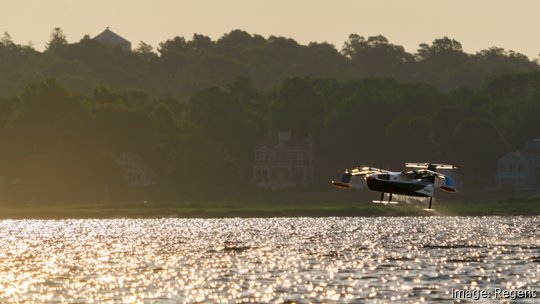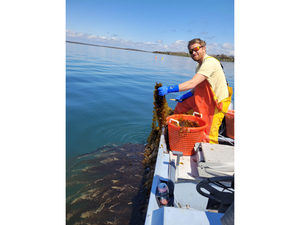
Over the last month, electric seaglider manufacturer Regent has made some big moves, announcing Dennis Muilenburg and David Neeleman to its board of advisors and strategic investments from Lockheed Martin and the Yamato Holdings.
Now, the North Kingstown company has finally unveiled a full-scale mock-up of its human carrying seaglider prototype — slated for flight testing in 2024 — as well as announced plans to expand its global headquarters in Rhode Island to include up to 600,000 feet of new manufacturing and testing facilities.
In a statement, the company said it expects to begin fulfilling $8 billion in commercial orders by mid-decade. Last year, Regent CEO Billy Thalheimer told a crowd at Quonset Business Park in North Kingstown that the new seagliders would allow passengers to “go from Providence to Manhattan in a hour-fifteen minutes.”
He told RI Inno that the new facility expansion will support initial low-rate production and at-rate production to fulfill Regent’s $8 billion commercial backlog. Thalheimer said the expansion will take place over the next several years and should be completed within the decade.
According to Regent, its seagliders have a range of approximately 180 miles, utilize existing dock structures, have zero emissions and cost half as much as ordinary aircraft. Thalheimer said the company is currently going through “hyper-growth” and continues to grow its order book of more than 400 seagliders from companies like Brittany Ferries, FRS (Germany), Mesa Airlines, Ocean Flyer (New Zealand), and Mokulele Airlines. Thalheimer said Regent expects its first commercial Viceroy seagliders to enter service by 2025.
Thalheimer said the mockup of the Viceroy will remain on display at its Rhode Island HQ in North Kingstown to showcase to anyone interested what its full-scale passenger crafts will look like once they are completed. He said testing of the prototypes is set to continue in the coming years with testing scheduled to commence in 2024.
“Our goal is to maximize all the performance metrics of our seagliders so that, when they are hitting the market by mid-decade, our seagliders offer the most utility to our customers as possible and, ideally, transform the world of coastal transportation,” he said. “Being a part of something growing this fast is incredible. We come into work every day at Regent excited about what the future holds and being able to achieve so many milestones in such quick secession gives us all the satisfaction of seeing real, tangible progress being made to our top-line goal.”
With that said, Thalheimer said it’s incredibly important to maintain standards and methodical approach to development even within these moments of hyper growth.
“As a company, we try to evaluate every business decision with our end-goal in mind: The first human seaglider flight. We only do things that serve our goal of making that a safe, sustainable reality, and are diligent in ensuring we have exactly the right team in place to execute on an ambitious timeline,” he said.
Thalheimer said he thinks their seagliders can provide a fundamentally new method of transportation for the 40% of the world’s population that live in coastal communities.
“Through our seagliders, we aim to revolutionize sustainable, maritime transportation in these regions by offering a fast, efficient, and emission-free solution. We see seagliders as a complementary addition, rather than a replacement, to traditional modes of maritime and airline transportation, which can be seamlessly integrated into our customers’ existing fleets,” he said. “Our studies, based on publicly validated data, show that our seagliders serve an $11 billion market that we project to swell to as much as $25 billion as battery technology advances.”
The company also announced that Southern Airways/Mokulele Airlines will receive the first commercial passenger seagliders once they hit the market and that it had tapped EP Systems and MAGicALL as key vendors for the batteries and motors that will power the prototype’s all-electric distributed propulsion system.








